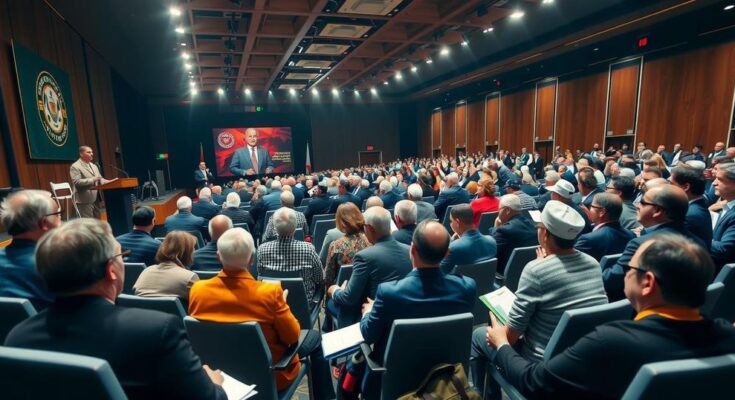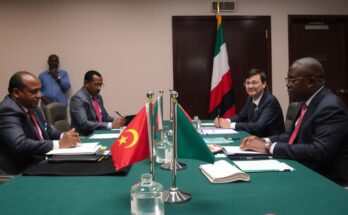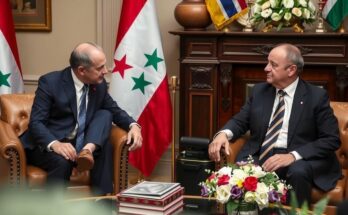G20 leaders convened in Brazil to discuss pressing global issues such as climate change and ongoing wars in Ukraine and the Middle East, under the influence of President Biden’s impending political transition and the prominence of President Xi. Brazil’s President Lula champions initiatives on poverty and taxing the wealthy while navigating resistance from Argentina among others. The summit aims to address critical climate finance and respond to severe environmental crises, amidst heightened security due to political unrest.
The leaders of the G20 convened in Brazil on Monday to deliberate on pressing global issues, including serious climate talks and conflicts in Ukraine and the Middle East, especially with the backdrop of former President Donald Trump’s anticipated political resurgence. United States President Joe Biden, attending his final summit as a sitting president, is overshadowed by Chinese President Xi Jinping, who is perceived as the meeting’s premier figure. Brazil’s President Luiz Inacio Lula da Silva aims to spotlight critical matters such as poverty alleviation, climate action, and imposing taxes on the wealthiest individuals. The ongoing conflicts that have caused significant divisions among G20 members, particularly the wars in Ukraine and the Middle East, remain critical topics of discussion. A source from Brazil’s foreign ministry indicated that while some nations push for alterations to the draft summit communique, others wish to finalize its wording. Notably, President Biden’s recent authorization for Ukraine to utilize long-range U.S. missiles to target sites in Russia represents a significant shift in policy, which may compel European allies to reassess their positions. Moreover, G20 leaders are pressed to revive UN climate discussions in Azerbaijan, which falter due to funding disagreements, particularly regarding financial support for developing nations. UN Secretary-General Antonio Guterres has urged the G20 members, who comprise 80 percent of global emissions, to demonstrate leadership in fostering an agreement. The gathering is marked by heightened security measures, following recent unrest linked to political extremism in Brazil. President Biden is on a farewell tour, which includes engagement with Asia-Pacific trading allies and a notable visit to the Amazon, where he asserted that his climate policies remain significant regardless of a potential future Trump presidency. At the COP29 climate conference in Azerbaijan, the focus lies on overcoming a stalemate concerning an estimated $1 trillion needed annually to assist developing countries in battling climate impacts. Rich nations are also seeking contributions from rapidly developing economies, including China and Gulf states. Compounding these challenges is a year characterized by severe weather anomalies, outlined by Brazil experiencing its worst fire season in a decade, exacerbated by drought conditions likely influenced by climate change. The last G20 meeting in India highlighted the need for increased renewable energy sources, yet refrained from explicitly advocating for an end to fossil fuel utilization. Russian President Vladimir Putin is notably absent, as he faces an International Criminal Court warrant related to the Ukraine conflict. President Lula emphasized that the discourse surrounding ongoing wars should not overshadow the more pressing issues of global poverty, advocating that the needs of non-combatants are equally critical and often overlooked. Lula inaugurated the summit with an initiative termed “Global Alliance against Hunger and Poverty,” alongside a push for wealthier individuals to be more heavily taxed. However, resistance has surfaced, notably from Argentinian President Javier Milei, a staunch libertarian and admirer of Trump. Despite some hesitancy expressed by Argentine officials regarding Lula’s proposals, Brazilian sources indicate that a consensus is likely achievable among G20 nations.
The G20 summit is a significant annual gathering that brings together leaders from the world’s major economies to address pressing global issues, including economic stability, climate change, and international security. This particular summit hosted in Brazil aims to navigate contentious topics such as the ongoing conflicts in Ukraine and the Middle East, as well as stalling momentum in climate negotiations. The dynamics of this meeting are influenced not only by the presence of major leaders, notably Biden and Xi, but also by the ambitions of host President Lula, who seeks to address issues of poverty and wealth inequality as part of broader global discussions. With the backdrop of intense geopolitical tensions and environmental crises, the outcomes of this summit could shape international policy directions significantly.
The G20 summit in Brazil serves as a critical platform for addressing global challenges, particularly in the realms of conflict resolution and climate change. With key issues including the Ukraine conflict, climate financing, and poverty alleviation taking center stage, the interactions and agreements forged here will have far-reaching implications. President Biden’s participation, alongside ongoing geopolitical tensions and environmental crises, underscores the necessity of collaborative global leadership. The efforts to balance diverse interests amid significant challenges will be crucial for achieving consensus at this pivotal gathering.
Original Source: www.fox28spokane.com




